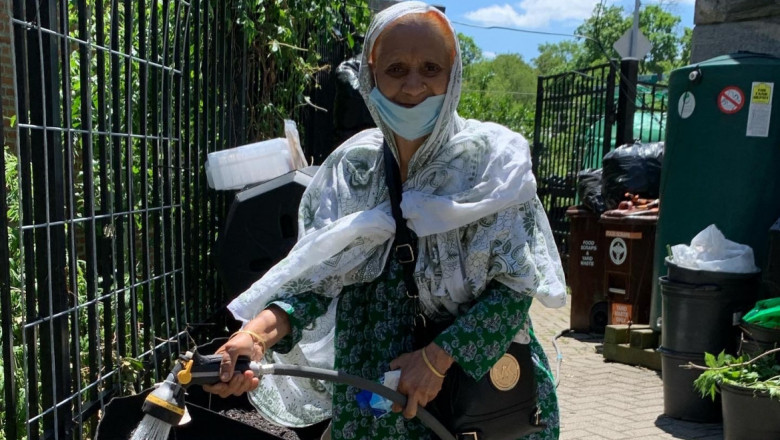
A member of Laal, Rokeya Begum, waters the plants already potted. (Courtesy of Sahreen Quadir)

A member of Laal, Rokeya Begum, waters the plants already potted. (Courtesy of Sahreen Quadir)
From my mother to my aunts, and to the Bangladeshi women I see playing roles on television, my role models growing up have always been strong, independent Bangladeshi women. Being a Bangladeshi woman myself, I have always had a strong appreciation for them. Bangladesh was recognized as its own country in the 1970s when the country gained its independence. However, almost 50 years later, Bangladeshi women are still fighting for equity and to have the same rights as men.
The Bangladeshi Diaspora is the fastest-growing immigrant population in New York City. According to the Asian American Federation, it is estimated that 74% (48,985) of Bangladeshis living in New York City were foreign-born, as of 2015, of which 53% were naturalized citizens.
Being a non-U.S.-born immigrant comes with many limitations, such as language barriers, the inability to vote in federal elections or work governmental jobs, lack of legal protection and access to healthcare or quality housing, plus trouble finding employment and educational opportunities. Being a woman can exacerbate these challenges. With little to no support, many Bangladeshi women also are often left to deal with problems of intergenerational trauma, immigration, and colonization, coupled with the stress of poverty, depression, and cycles of abuse.
New York City resident Sahreen Quadir, has noticed this toxic cycle throughout her life. Quadir saw her mother struggle when moving to the U.S. Reflecting on how her mother faced the same challenges that many Bangladeshis experience, Quadir said, “My mother was an immigrant to this country. I saw firsthand growing up what the lack of resources can do to someone’s livelihood and how it can affect their children.”
Quadir saw the degree to which women were underserved in her community and wanted to make a change. She now works for a nonprofit company in the Bronx called, “Laal.” In Bangla, “Laal” means “red,” and symbolizes many important attributes for Bangladeshi women. Bangladeshi women are famously known for cooking with red bhindi (a kind of okra), women wear a red saree on their wedding day, and the red sun on the center of the Bangladesh flag symbolizes independence.
Laal was founded by a Bangladeshi woman, Sanjana Khan, and is the epitome of a “for women, led by women” organization. This nonprofit provides resources for women to live healthy and engaged lives. Laal provides several programs to give Bangladeshi women resources, including a community garden.
Another member, Shahela Begum, founded the Laal Bhagan initiative, which is a community garden led by Bangladeshi women in Norwood, The Bronx. Laal Bhagan means “Red Garden” in Bangla. The initiative merges Bangladeshi Indigenous gardening practices and adapts them to an urban environment. It also promotes community building among Bangladeshi women, while giving them space to grow essential foods, including fresh spinach, habanero peppers, parsley, bitter melon, squash, beans, and more.
The women are reclaiming traditional and Indigenous agricultural practices from Bangladesh. According to a survey conducted by Laal, 71% of Laal members have immigrated straight from rural Bangladesh. Many had never been to a major city in Bangladesh like Dhaka, Sylhet, or Chittagong. They come from villages where farming and growing their own food was a common practice, and immigrated straight to the Bronx neighborhood in New York City.
Through Laal Bhagan, they were taught new environmental concepts, such as sustainable gardening, composting, and how to pest control plants, while still being taken back to their roots. Laal Bhagan is especially important to have in the Bronx, since the area has no public gardening space.
Laal Bhagan was directly formed due to the epidemic of isolation and the mental health crisis that many women were experiencing, which was further exacerbated by the COVID-19 pandemic. But by participating in Laal Bhagan, many of these women have made great improvements to their lives through their connection to the soil. This connection also has a scientific basis, as contact with soil releases serotonin. According to a study by Bristol University and University College London, contact with a soil bacteria called Mycobacterium vaccae triggers the release of serotonin in our brains, and which can act as an antidepressant.
This isn’t just about growing food, it’s about creating a safe space for Bangladeshi women. All vegetables grown at Laal Bhagan are authentically native to Bangladesh. Combining physical activity with social interaction and exposure to nature and sunlight is very beneficial to human health. All goods grown at Laal Bhagan will go into their Laal Ranna program, which is about preserving traditional Bengali cooking methods and recipes.
When asked, “So, what’s next for Laal?” Quadir describes Laal Bhagan’s future and remarks that the garden is undergoing an assessment at the time. She is hoping to create a larger garden within their organization’s own space, anticipated to launch in summer 2023. Laal also recently launched a health initiative program in 2022, the Reproductive Justice Initiative in partnership with the Midwifery Clinic at North Central Bronx Hospital.
This is the first curriculum in the United States that goes deeply into educating women about sexual and reproductive health in Bangla. Laal has been doing incredible work in trying to change lives, by giving these Bangladeshi women the skills to improve their lives and well-being while leveling the playing field. Big strides are being made by this nonprofit in the Bronx. As Sanjana Khan, the founder of Laal once said, “If we don’t, who will?”